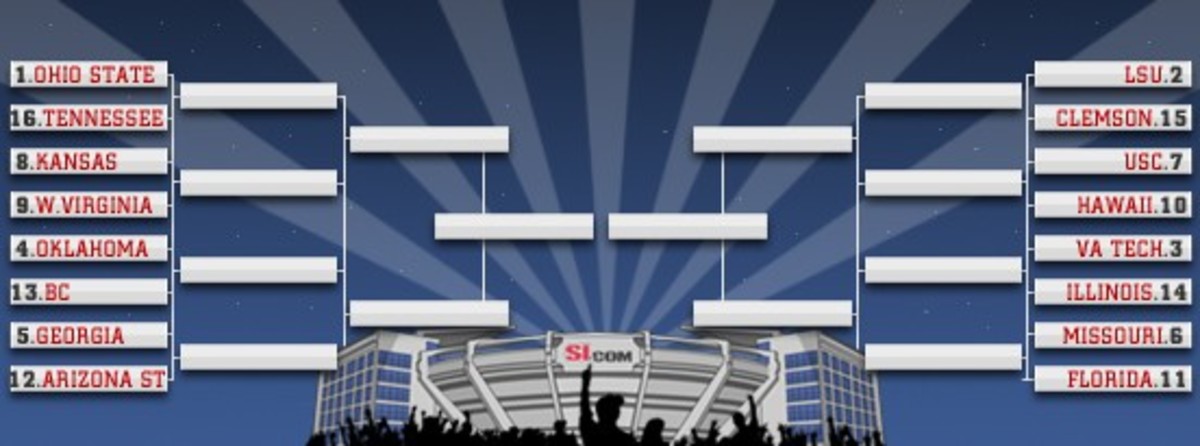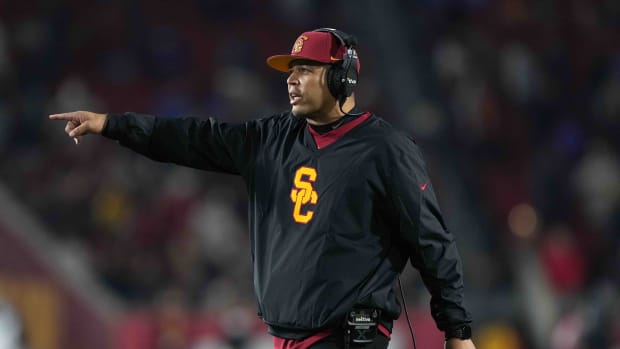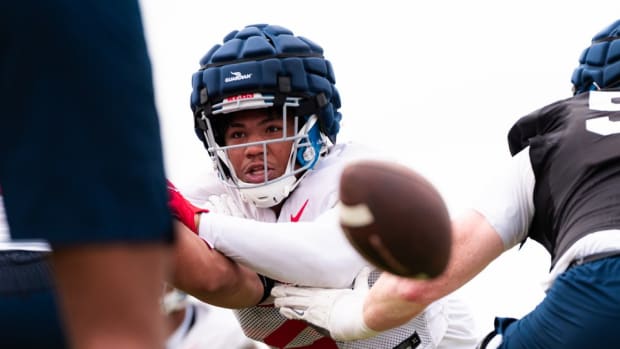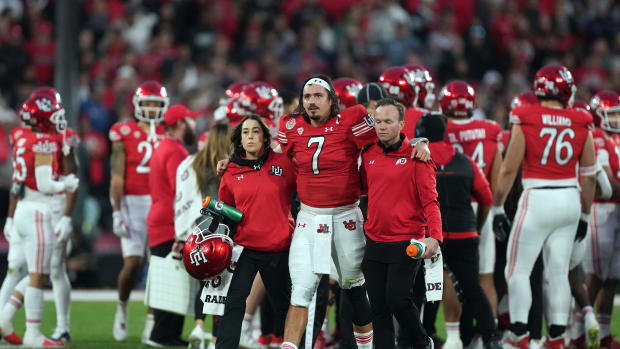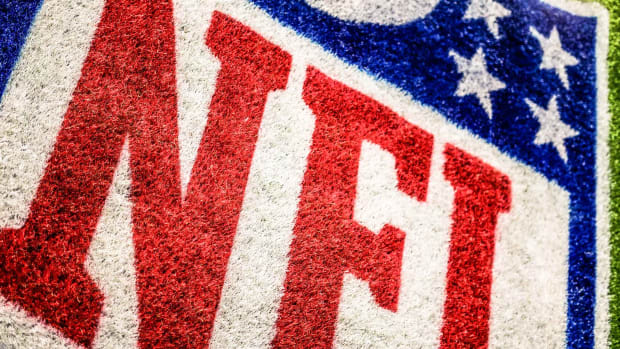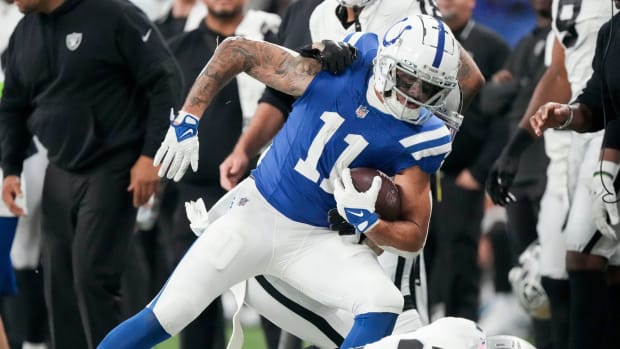Ultimate Playoff
No. 1 Ohio State vs. No. 16 Tennessee: The Volunteers were the last team to get in to this tournament, just ahead of BYU. Their reward? A date with the No. 1 team in the country.
The Buckeyes' strength is their defense, which ranks first nationally in total defense (225.25 yards per game) and scoring defense (10.7 points per game). Led by star DE Vernon Gholston, Ohio State also ranks third in sacks (42). But the Buckeyes' talented front seven may find it difficult to apply pressure on Tennessee QB Erik Ainge -- the Vols have allowed just four sacks all season (first nationally).
Tennessee's defense has left something to be desired all season long, especially against the pass. The Volunteers apply minimal pressure on opposing QBs, so Buckeyes signal-caller Todd Boeckman could have a big game.
No. 2 LSU vs. No. 15 Clemson: In this battle among opposing Tigers, defense is king. LSU ranks third in total defense and fifth in turnover margin, while Clemson ranks sixth in total defense and ninth in turnover margin. LSU's offense has been more consistent than Clemson's throughout the season. After Ryan Perrilloux's MVP performance in the SEC title game, Les Miles may go back to regularly using two quarterbacks in this game. Clemson's offense hasn't been as explosive as many predicted, but the Tigers still have the potential to put up points in a hurry. Clemson QB Cullen Harper has been impressively efficient (67 percent completion rate, 27 TDs, six interceptions) in his first year as the starter. Harper threw for 372 yards against a talented Virginia Tech defense, but he also had two interceptions, once of which was returned for a TD. Against LSU's speedy D, Harper will need some significant help from "Thunder and Lightning," James Davis and C.J. Spiller.
No. 3 Virginia Tech vs. No. 14 Illinois: Following a heartbreaking loss to Boston College in late October, the Hokies finished the regular season by rolling off five straight victories in convincing fashion (winning by an average of 19.8 points). One of the biggest keys to Virginia Tech's hot streak has been Frank Beamer's decision to split time between two vastly different quarterbacks: Sean Glennon and Tyrod Taylor. Glennon excels in a traditional pocket-passer role, while Taylor beats defenses with his legs. Illinois' defense has done a good job of keeping points off the board, but it's not impenetrable. This game will be decided by how well the plucky Fighting Illini offense can fare against Virginia Tech's vaunted defense. Can Juice Williams and Rashard Mendenhall slay the Hokies?
No. 4 Oklahoma vs. No. 13 Boston College: This matchup centers around two quarterbacks at different stages in their career. Oklahoma QB Sam Bradford is just a freshman, but he finished the regular season as the nation's leader in pass efficiency (34 TDs, seven picks) and has thrown at least three touchdown passes in eight games this season. Bradford has to be salivating over this draw, as the Eagles rank 103rd in pass defense. On the other side, Matt Ryan is putting the finishing touches on a fabulous career at Boston College. A projected first-round pick in the '08 NFL Draft, Ryan's skill set draws rave reviews. Usually known as a defensive powerhouse, Oklahoma has struggled a fair amount this season. The Sooners were on point against Missouri in the Big 12 title game, though, terrorizing Heisman candidate Chase Daniel all game. Ryan should be tested by Bob Stoops' rejuvenated bunch.
No. 5 Georgia vs. No. 12 Arizona State: Georgia is arguably the hottest team in America, thanks in large part to the emergence of freshman sensation Knowshon Moreno. The running back forces opposing defenses to respect the run, opening things up for sophomore QB Matthew Stafford. Arizona State is tough against the run, but the Sun Devils have allowed a fair amount of yards through the air. (Just a few weeks ago, USC's John David Booty threw for 375 yards and four touchdowns.) Dennis Erickson's offense is led by Rudy Carpenter. The junior signal-caller has been through a lot during his time in Tempe (including a well-covered QB controversy with Sam Keller following Carpenter's freshman year), but he's become a steady leader for the Sun Devils. He'll face a stout Georgia defense that has been pretty consistent all season.
No. 6 Missouri vs. No 11 Florida: This game features the two biggest Heisman candidates in the tournament: Florida's Tim Tebow and Missouri's Chase Daniel. Both talented signal-callers will have a chance to showcase their skills in this potential shootout. Missouri's defense may be able to slow down Tebow on the ground, but the Tigers have struggled mightily against the pass. On the other hand, Florida's pass defense is nothing to write home about. And the Gators' inability to consistently pressure opposing quarterbacks could doom them against Daniel, who has proven lethal when given time in the pocket. Both of these teams are young and looking to gain momentum for a big season.
No. 7 USC vs. No. 10 Hawaii: All season people have complained about the Warriors' schedule. Talk about being thrown into the fire -- Hawaii must take on the red-hot Trojans, who are finally playing the kind of dominant football pundits expected to see all season. Behind dynamic passer Colt Brennan, Hawaii's offense leads the nation in scoring, averaging more than 46 points per game. But USC's stingy defense has yielded 30 points just once (in a 49-31 win over Nebraska). Contrary to what some might think, this game will not be a cake walk for USC's offense. Hawaii -- which boasts stellar speed in its front seven -- ranks a respectable 33rd in total defense. The blitz-happy Warriors specialize in harassing opposing quarterbacks, so it could be a long day for inconsistent QB John David Booty. Can the undefeated Warriors continue their dream season?
No. 8 Kansas vs. No. 9 West Virginia: This game features two vastly different versions of college football's most popular trend: the spread offense. Kansas employs a fast-paced, no-huddle passing spread, relying on the quick decision making of sophomore QB Todd Reesing. West Virginia runs a spread option, which showcases the breakneck speed of its numerous playmakers, including Pat White, Steve Slaton, Darius Reynaud and Noel Devine. The Jayhawks rank second in scoring offense (averaging 44.33 points per game), while the Mountaineers boast the nation's fourth-best rushing attack (292.92 yards per game) and have eclipsed 30 points nine times this season. Both offenses will face stiff opposition, though -- West Virginia and Kansas rank fourth and 14th, respectively, in total defense.
